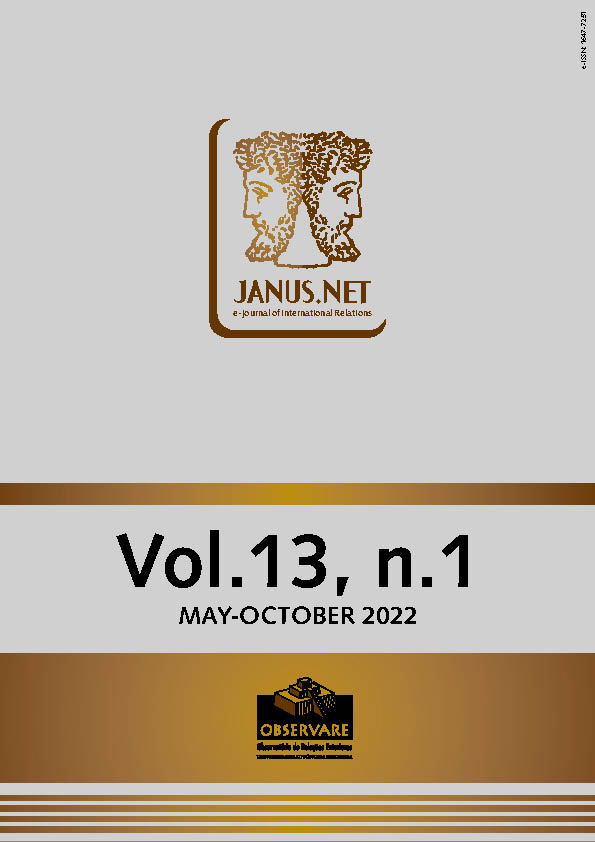This article focuses on the present context of the climate and environmental crises and how these fundamentally challenge the inherently anthropocentric norms, conceptions and practices of international politics and IR. I argue that, in order to confront the hegemonic, anthropocentric mode of relationship with non-human nature that has led to these crises, alternative frameworks need to be developed that might lead to a gradual transformation of modern political communities. Departing from Critical IR Theory, I suggest that Andrew Linklater’s and Robyn Eckersley’s critiques of Westphalia and proposals for its transformation might be useful to understand how the emergent Rights of Nature movement may promote such transformation. I look at two paradigmatic cases from the Rights of Nature movement – the Whanganui River case in Aotearoa New Zealand, on a local level, and Ecuador’s 2008 Constitution, on a national level – to briefly reflect on the alternative understandings of concepts such as community, subjecthood, agency, voice, rights, participation and representation that they encourage. By expanding these concepts as to include the morethan-human world, these RoN frameworks invite a transformation of modern systems of thought and practice, and – to a certain extent – constitute a potential for the transformation of modern political communities in ways that might enable a better response to the global climate and environmental crises.
RIGHTS OF NATURE AS A POTENTIAL FRAMEWORK FOR THE TRANSFORMATION OF MODERN POLITICAL COMMUNITIES
Bachelor’s degree in International Relations and a master’s degree in IR – Peace, Security and Development Studies from the Faculty of Economics of the University of Coimbra. She was a junior researcher at the Centre for Social Studies of the University of Coimbra and is currently a PhD researcher at Wageningen University (Netherlands) as part of the ERC-funded research project “RIVERHOOD – Living Rivers and New Water Justice Movements”. Her current research interests include Critical Political Ecology; Rights of Nature and Multispecies Justice; Critical IR Theory and Post-Anthropocentrism; and Indigenous Ontologies and Knowledge Systems.
Resumo
Este artigo centra-se no contexto atual das crises climática e ambiental e na forma como estas desafiam fundamentalmente as normas, conceções e práticas inerentemente antropocêntricas da política internacional e das RI. Defendo que, para enfrentar o modo hegemónico e antropocêntrico de relação com a natureza não-humana que conduziu a estas crises, é necessário desenvolver quadros alternativos que possam levar a uma transformação gradual das comunidades políticas modernas. Partindo da Teoria Crítica das RI, sugiro que as críticas de Andrew Linklater e Robyn Eckersley a Vestefália e propostas para a sua transformação possam ser úteis para compreender como o movimento emergente dos Direitos da Natureza pode promover tal transformação. Analiso dois casos paradigmáticos do movimento dos Direitos da Natureza - o caso do Rio Whanganui em Aotearoa Nova Zelândia, a nível local; e a Constituição do Equador de 2008, a nível nacional - para refletir brevemente sobre os entendimentos alternativos de conceitos como comunidade, subjetividade, agência, voz, direitos, participação e representação que eles encorajam. Ao expandir estes conceitos de modo a incluir o mundo mais-do-que-humano, estes quadros de RoN convidam a uma transformação dos sistemas modernos de pensamento e prática, e - em certa medida - constituem um potencial para a transformação das comunidades políticas modernas de modo a permitir uma melhor resposta às crises climática e ambiental globais.
Palavras-chave
Como citar este artigo
Houart, Carlota (2022). Rights of Nature as a potential framework for the transformation of modern political communities. In Janus.net, e-journal of international relations. Vol13, Nº. 1, May-October 2022. Consulted [online] on the date of the last visit, https://doi.org/10.26619/1647-7251.13.1.9
Article received on 15 June, 2021 and accepted for publication on 5 March, 2022















